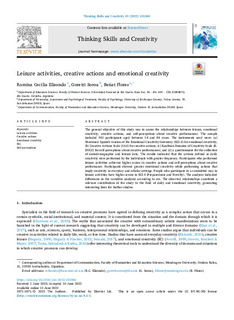Title
Leisure activities, creative actions and emotional creativityAuthor
xmlui.dri2xhtml.METS-1.0.item-contributorOtherinstitution
https://ror.org/0002pcv65https://ror.org/000xsnr85
Version
http://purl.org/coar/version/c_970fb48d4fbd8a85
Rights
© 2022 The AuthorsAccess
http://purl.org/coar/access_right/c_abf2Publisher’s version
https://doi.org/10.1016/j.tsc.2022.101060Published at
Thinking Skills and Creativity Vol. 45, 101060xmlui.dri2xhtml.METS-1.0.item-publicationfirstpage
1xmlui.dri2xhtml.METS-1.0.item-publicationlastpage
9Publisher
Elsevier LtdKeywords
Leisure activities
Creative actions
Emotional creativity
Sex ... [+]
Creative actions
Emotional creativity
Sex ... [+]
Leisure activities
Creative actions
Emotional creativity
Sex
Self-perceptions [-]
Creative actions
Emotional creativity
Sex
Self-perceptions [-]
Abstract
The general objective of this study was to assess the relationships between leisure, emotional creativity, creative actions, and self-perceptions about creative performances. The sample included 542 p ... [+]
The general objective of this study was to assess the relationships between leisure, emotional creativity, creative actions, and self-perceptions about creative performances. The sample included 542 participants aged between 18 and 84 years. The instruments used were: (a) Shortened Spanish version of the Emotional Creativity Inventory (ECI-S) for emotional creativity; (b) Creative Actions Scale (CAS) for creative actions; (c) Kaufman Domains of Creativity Scale (K-DOCS) for self-perceptions about creative performances; and (d) a questionnaire for the collection of sociodemographic and leisure data. The results indicated that the actions defined as daily creativity were performed by the individuals with greater frequency. Participants who performed leisure activities achieved higher scores in creative actions and self-perceptions about creative performance. Participants showed greater emotional creativity while performing actions that imply creativity in everyday and scholar settings. People who participate in a committed way in leisure activities have higher scores in ECI-S (Preparedness and Novelty). The analyses indicated differences in the variables analysed according to sex. The observed relationships constitute a relevant contribution of the study to the field of daily and emotional creativity, generating interesting lines for further studies. [-]
Collections
The following license files are associated with this item:























